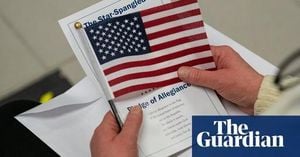Iranian Foreign Minister Abbas Araghchi is set to visit Saudi Arabia and Qatar on Saturday, May 10, 2025, just days before the fourth round of U.S.-Iran negotiations scheduled for Sunday, May 11, in Oman. This visit comes at a pivotal time as U.S. President Donald Trump embarks on a regional tour, highlighting the delicate balance of diplomacy in the Middle East.
During his visit, Araghchi will hold discussions with senior officials in Riyadh, focusing on a range of pressing issues, including the ongoing nuclear talks with the United States. "We believe that the sustainability of any possible agreement depends to a large extent on taking into account the considerations and concerns of the countries of the region in the nuclear field and the common interests of Iran and them," Araghchi stated in a video released by local media.
Furthermore, Araghchi's agenda will include discussions about Israel's ongoing military actions in Gaza. Reports indicate that he will address the humanitarian crisis resulting from the Israeli blockade, which has persisted for over two months, leading to severe malnutrition and famine-like conditions in the region. The Iranian Foreign Minister is also expected to discuss the broader implications of Israeli attacks on Lebanon, Yemen, and Syria.
As Araghchi prepares for his meetings in Riyadh, the backdrop of U.S.-Iran negotiations looms large. Trump is scheduled to visit Saudi Arabia, Qatar, and the United Arab Emirates from May 13 to 16, 2025, making the timeline of these diplomatic efforts particularly significant. The fourth round of negotiations follows a series of talks that have marked the highest-level contact between Iran and the U.S. since Washington's withdrawal from the landmark nuclear deal in 2018.
On May 7, 2025, Trump announced that he would decide how the United States would officially refer to the Gulf region, with reports suggesting he might call it the Gulf of Arabia instead of the Persian Gulf. Araghchi condemned this potential change, arguing that it would reflect "hostile intent toward Iran and its people." This statement underscores the sensitive nature of regional identities and the implications of such terminology in diplomatic discussions.
In the lead-up to Araghchi's visit, U.S. Middle East envoy Steve Witkoff noted that the negotiations were "progressing positively," and emphasized that Trump "prefers diplomatic solutions if the opportunity presents itself." Witkoff's statements suggest a cautious optimism regarding the potential for an agreement, although the complexities of the situation remain significant.
Fatemeh Mohajerani, a spokesperson for the Iranian government, confirmed that Tehran has taken necessary measures in preparation for the upcoming talks. She asserted that Iran's position is "firm and clear," stating, "we are only negotiating about the nuclear issue…it is the right of the Iranian people to use this energy." Mohajerani also characterized U.S. sanctions against Iran as "unilateral economic terrorism and a violation of human rights," reflecting Tehran's frustration with the current state of affairs.
As the negotiations approach, the Iranian government has expressed skepticism about the outcome, with Mohajerani noting that recent U.S. statements have increased doubts regarding the prospects for a successful resolution. The Iranian leadership has indicated that their approach will remain steadfast, focusing solely on the nuclear issue, which they assert is critical for Iran's sovereignty and energy rights.
Meanwhile, Russian President Vladimir Putin has offered to facilitate dialogue between Iran and the United States, indicating a willingness to support diplomatic efforts aimed at achieving a fair agreement. This development highlights the broader geopolitical dynamics at play, as various nations seek to influence the outcome of the negotiations.
The fourth round of U.S.-Iran talks, originally scheduled for May 3 in Rome, was postponed, adding to the already complex timeline of diplomatic engagements. As the situation evolves, the international community watches closely, recognizing the potential implications for regional stability and global security.
In conclusion, the upcoming meetings between Araghchi and Saudi officials, along with the anticipated U.S.-Iran negotiations, represent critical moments in a long-standing conflict. With multiple stakeholders involved and a myriad of issues on the table, the outcomes of these discussions could significantly impact the future of relations in the Middle East.



